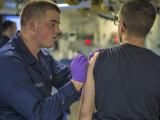Jun 25, 2003 (CIDRAP News) Experience in the current US military smallpox immunization program makes clear that heart inflammation is a possible complication of vaccination, but the overall record suggests that smallpox vaccination today may be safer than in the past, according to reports published today in the Journal of the American Medical Association.
Myopericarditis occurred at a rate of about 78 per 1 million first-time vaccinees in the military program, according to a report by Jeffrey S. Halsell, DO, and colleagues. "Myopericarditis should be considered an expected adverse event associated with smallpox vaccination," they write. They advise clinicians to consider myopericarditis as a possibility in patients who have chest pain 4 to 30 days after smallpox vaccination.
Another article, looking at the overall safety record of the program, says there have been no deaths and no cases of eczema vaccinatum or progressive vaccinia. "Our experience suggests that broad smallpox vaccination programs may be implemented with fewer serious adverse events than previously believed," states the report by John D. Grabenstein, RPh, PhD, and William Winkenwerder, Jr., MD, assistant defense secretary for health affairs.
Halsell and colleagues report 18 cases of probable myopericarditis among 230,734 primary vaccinees who received shots between December and mid-March. No cases occurred among the 95,622 previously vaccinated service members who were immunized during that time. All the cases were in white men and all experienced chest pain between 7 and 19 days after vaccination. The rate of 1 case in 12,819 primary vaccinees is 3.6 times higher than the expected rate among unvaccinated military personnel, the report says. This, plus the timing and wide geographic distribution of the cases, suggests that the vaccine caused the problem.
The report also notes that a few cases of myopericarditis were reported in smallpox vaccinees decades ago. In a JAMA editorial, Mary E. Wright, MD, and Anthony Fauci, MD, of the National Institute of Allergy and Infectious Diseases, comment, "It is unclear whether the apparent increase of this adverse effect currently reported is a function of tighter modern day surveillance and diagnostic capability or a true increase in incidence."
Grabenstein and Winkerwerder report that 450,293 military personnel were vaccinated from December through May 28. There were 21 cases of contact vaccinia (transmission of vaccinia from vaccinees to others), but no transmission from healthcare workers to patients, the report says. Two cases of encephalitis were reported in vaccinees, but only one case met objective criteria for the disorder, and both patients recovered fully.
The report also says that 10 men who were vaccinated and later found to be HIV-positive suffered no complications from the vaccine. The men responded successfully to vaccination, and their lesions healed normally, the article states. The percentage of people with HIV and other immunocompromising conditions in today's population has fueled speculation that smallpox vaccination could cause a higher rate of adverse events now than it did decades ago.
"The observation that this smallpox vaccine can be administered safely in a 21st-century population with a very low adverse-event rate is a critically important piece of new information," state Wright and Fauci in their editorial. They say the analysis shows that generalized vaccinia, encephalitis, and auto-inoculation (transfer of vaccinia to skin sites away from the vaccination site) occurred at rates "similar to or less than those of the 1960s."
The reports on myopericarditis and overall vaccine safety are among four new JAMA articles focusing on smallpox vaccination. A third article deals with the response to smallpox vaccine in previously vaccinated people, and a fourth reports on cases of folliculitis in primary vaccinees.
Halsell JS, Riddle JR, et al. Myopericarditis following smallpox vaccination among vaccinia-naïve US military personnel. JAMA 2003;289(24):3283-9 [Abstract]
Grabenstein JD, Winkenwerder W. US military smallpox vaccination program experience. JAMA 2003;289(24):3278-82 [Abstract]
Wright ME, Fauci AS. Smallpox immunization in the 21st century: the old and the new. (Editorial) JAMA 2003;289(24):3306-8


















